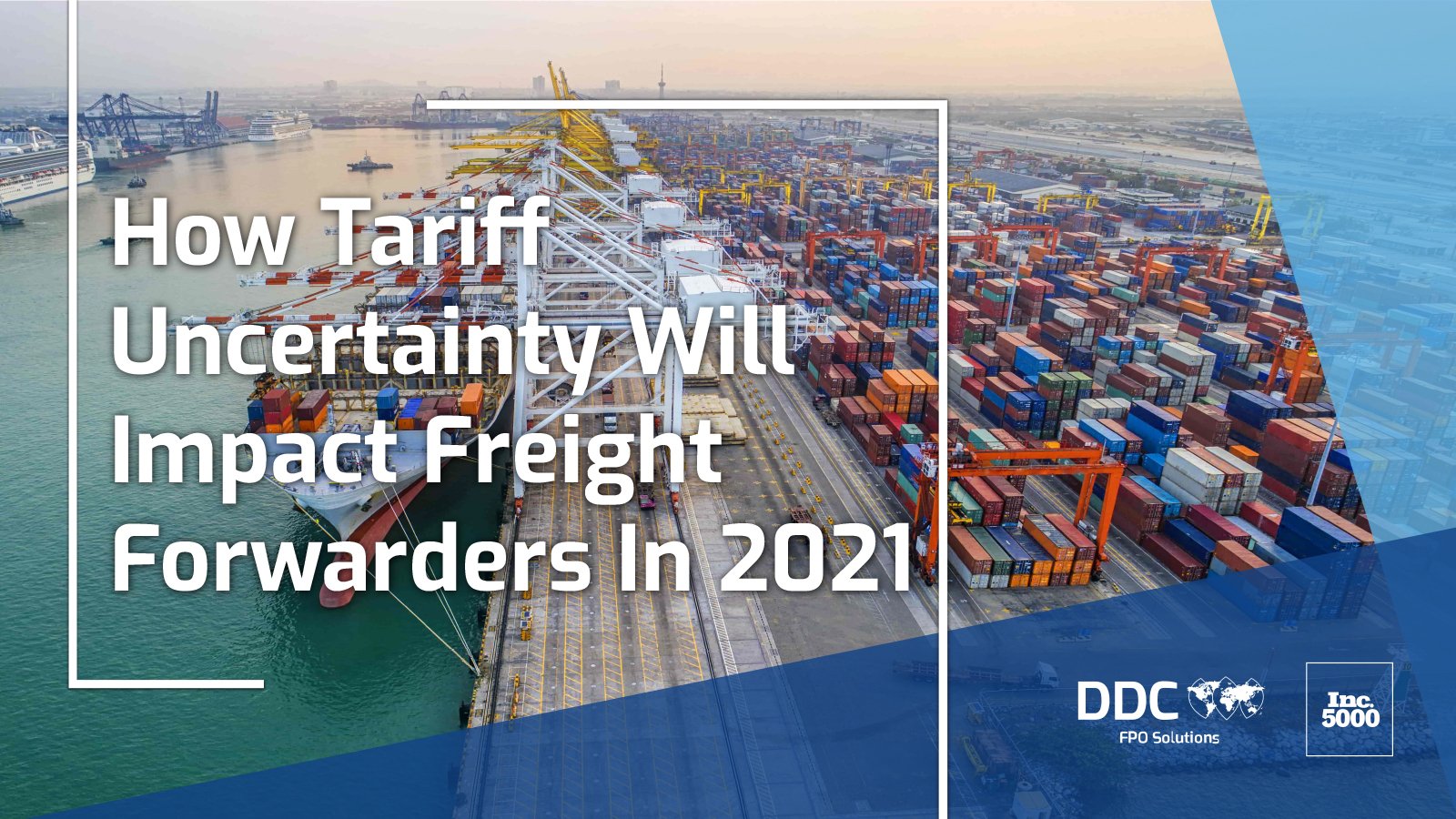How Tariff Uncertainty Will Impact Freight Forwarders in 2021

It may be a new year, but the trade uncertainty between the U.S. and other countries continues to linger and loom over customs and compliance teams.
At the forefront of the global trade landscape is the trade deal between the U.S. and China. The variability is due in large part to multiple rounds of imposed tariffs: On January. 15, 2020, a multibillion-dollar trade agreement was signed that outlined changes to China’s economic and trade regime, while the tariffs originally imposed on Chinese imports remained unchanged.
The original deal stipulated that China would commit to purchasing an additional $200 billion of American-made goods and services over 2020 and 2021, on top of 2017 (and not 2019) levels, when bilateral trade was more robust, according to the Peterson Institute for International Economics (PIIE). The agreement left 25% and 7.5% tariffs on approximately $250 billion and $120 billion worth, respectively, of Chinese imports, according to PwC’s 2021 Tax Policy Outlook.
Uncertainty isn’t limited to pacific trade, however. After a series of escalating tariff announcements regarding US-Canadian imports and exports, things seem to have cooled for now. However, in the world of international trade the situation can shift overnight, and even the most established international relationships are vulnerable to disruption.
With that disruption can come sudden shifts in compliance and paperwork that can overwhelm your ability to operate smoothly and reliably. Brexit is another prime example — thousands of organizations have had to rework their customs and compliance workflows on a tight timetable to ensure consistent operations.
Now, with 2021 well underway, the trade industry expects another wave of unpredictability due to unknowns related to tariffs. PwC notes in its outlook that “no indication of a new direction has been given with respect to the tariffs, and it appears likely that the tariffs would remain in place at least for the near term.”
In the meantime, producers, shippers, forwarders and carriers are finding it infeasible to plan, forecast and make decisions in a constantly evolving tariff landscape, alongside new protectionist measures, sanctions and compliance rules, according to Logistics Management.
So how are customs and compliance teams expected to adapt to the uncertainty? How can they keep up amid the turbulence?
Compliance Standards Are Evolving
Ongoing regulatory changes and an ever-changing tariff situation are heavily impacting the ability to import and export goods. The risks of not meeting regulatory compliance are significantly increased in such a complex environment when companies are entering into global supplier contracts, given that every country has its own regulations.
In addition, every region has different tax obligations, which can make organizations vulnerable to tax risk, according to Jeremy Capes, Partner, Tax for KPMG, who points out that tax laws are “evolving faster and in different ways, ever-increasing in complexity.”
Compliance experts caution that it pays to be prepared to avoid costly mistakes — particularly when applying a new strategy to save on tariffs. This is particularly crucial because Customs and Border Protection (CBP) is heightening its focus on compliance, according to Tom Gould, former senior director of the Customs and International Trade Law firm at Sandler, Travis & Rosenberg, P.A. and a member of the U.S. Customs and Border Protection’s Trade Support Network, in Logistics Management.
“CBP is seeing a ton of mistakes from shippers,” Gould said. “Whether you’re trying a new strategy to save on tariffs or are using a tactic you’ve used in the past, you just have to be more aware that CBP is looking more closely than it has before.”
Potential Business Risks
If your business is struggling to stay on top of the complexities of the international trade tariff evolution, you’re risking quite a lot: costlier imports, less competitive exports, fluctuating foreign exchange rates, shorter contracts, canceled orders, reduced consumer demand and slower customs procedures, according to American Express. The end result? Profit margins may decrease — or disappear altogether.
Transportation providers that look ahead, however, are more likely to sidestep the costly fines, penalties or seizure of shipments that come with non-compliance. A comprehensive customs brokerage software solution is one of the most effective tools for staying up-to-date.
The risks affect everyone differently, too. Some domestic suppliers might actually benefit from customers redirecting their orders locally to avoid paying international trade tariffs, while some businesses may get hit twice from paying more for components or raw materials in their global supply chain and selling fewer exports because the final products are priced out of overseas markets.
Competitor responses to the possibility of increased international trade tariffs alone may influence the business environment, and create new, unforeseen unknowns.
Shifting the Burden
Buckle in, because experts say this high-tariff environment will likely drag on. High tariffs will persist due to issues like U.S. concerns over cybersecurity and China’s industrial policy plans and subsidy programs, as well as questions regarding whether China can fulfill its ambitious commitments, according to BCG.
The best bet to prepare for the future — whatever it may look like — lies in leaning into uncertainty via preparation and working to ensure business continuity to protect your bottom line. Prepare scenario-based plans and playbooks for multiple outcomes, along with adaptable processes and the enabling technologies to execute them, suggests Supply Chain Beyond.
Now, more than ever, it’s imperative to modernize your business strategies and systems. Particularly, consider shifting the burden of staying on top of tariff changes onto a strategic partner with deep knowledge on the subject and the tools to facilitate the process.
The benefits are manifold and include:
-
Expertise that will guide you to make the right decisions at the right time for your particular business.
-
A streamlined, comprehensive system that will keep you up-to-date and compliant with the required and ever-changing regulations.
-
Peace of mind amid a turbulent situation that will serve your business for both the near- and long-term future.
Conclusion
It’s clear that many companies are navigating uncharted waters and must adopt a change-oriented mindset until more is known about new tariff policies in the new year. As compliance standards and regulations continue to evolve, it’s important to stay as updated as possible to avoid costly fines, as well as other potential business risks.
Connect with Us
Discover customs brokerage processing services that enable accurate and compliant freight delivery.
How Can We Help You?
Get in touch to learn how we can support your success.
Get Started
